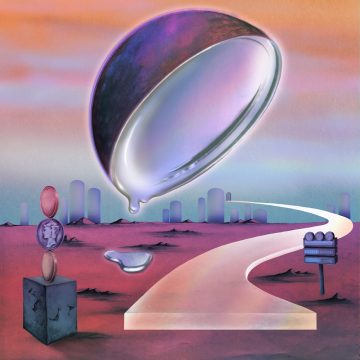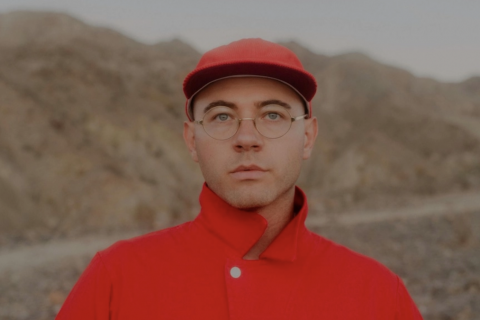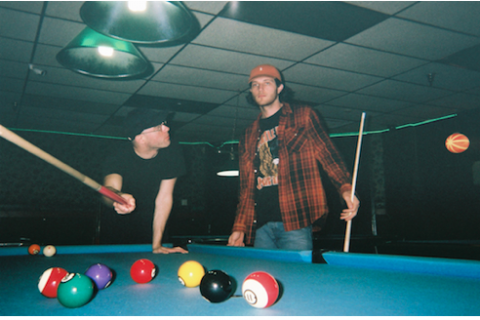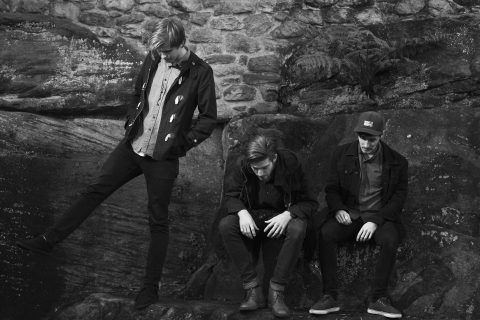Eastern US producer James Hinton, otherwise known by his musical alias The Range has carved out a unique space in both dance and beats spheres respectively with a genre-defying blend of beat-skipping drums, dense sound design and brightly lit melodies into one ethereal mix.
Making his commercial debut in the early 2010s with an ambitious string of EPs on Donkey Pitch, Hinton has been a tireless purveyor of surreal yet jubilant beats rife with disembodied vocals that stutter, loop and pitch-shift like ghostly remnants of numbers stations. The advent of his two full length LPs brought a certain melancholy to the rave euphoria of his sound, rich with obscure samples pulled from the depths of the web, and the work of unknown vocalists Hinton met online during the making of his last full-length ‘Potential’.
Ahead of his latest album Mercury (out now), we sat down to discuss his musical origins, creative process and the turbulent past 5 years during the making of the album.
Stoney Roads: Growing up in rural Pennsylvania, what kind of music did you listen to, and how did that change upon moving to Providence?
The Range: Well, I kind of grew up without internet for a while. We got a computer in 1995 and then the internet around 1999 or 2000, so there was a definite period before then when all we had around was my mom’s records. Stuff like The Beatles, jazz records, some Chopin, Billy Joel and so on – a real mix. As soon as we got internet, that was totally flipped on its head, and me and my friends would just go crazy exploring all this random stuff, and from then I just soaked up as much music as I could. Back then it was so different from when I moved to the city because I didn’t know what was cool, I’d just dig into all this Warp Records stuff which felt really crazy and experimental at the time. When all you have is your parents’ records, you’re just at the mercy of the radio basically, so when the internet came out I just got so hungry for new music because it was so insanely fresh and exciting.
Stoney Roads: What was the dominant music scene in Providence at the time?
The Range: Providence had a really big hardcore punk scene. A lot of warehouse gigs and that kind of thing. I wouldn’t say there was a dance scene per se. I mean Nicolas Jaar was there and there’d be occasional raves, but it wasn’t a big scene or anything like that. Electronic music was just something I was interested in having grown up with the Warp back catalogue, and French touch was really hitting me hard in college. The thing that inspired me to create was just being around all these people making weirdo music with all their respective influences and things like that. I think that was kind of an offshoot of this reverence towards the avant-garde which I think is just part of the Rhode Island culture.
Stoney Roads: Talking more recently about your move to Vermont before the pandemic to work on the album, you’ve described rural life as attractive for focusing on your art, but also a prison of your own making.
The Range: I’m very conflicted because I have that background of living rurally in Pennsylvania, and I love that feeling of being a kid and staying up late in the basement working on projects, but back then I had my mom, my dad and my grandma so it was different to what I’ve lived in the past four years where it’s just been me alone with no-one nearby. It was extreme, like seeing nobody outside of the grocery store for months. You definitely need people, otherwise you lose your mind, just like what everyone saw with COVID. Loneliness can also kill creativity after a certain amount of time too because you eventually lose sight of why you’re doing this thing in the first place. You just get burned out and stop doing things.
Even before lockdown hit, I’d totalled my car in 2019 and just didn’t get a new one, so I was basically in isolation 8 months before COVID even hit. I definitely started feeling kind of lost and left out, and felt that I’d gotten myself into trouble by living like this.
Stoney Roads: Funnily enough, a lot of the music on this new record is some of your most upbeat yet. Did you use music as a kind of escapism from your situation or did you just see the light at the end of the tunnel?
The Range: Well our highs and lows definitely come in waves, and I think a lot of the time I was trying to capture those high points to draw from them. I also like to see my work as books on a bookshelf that archive a certain time of my life, in this case the time between 2017-2021. When I look back, I want to feel those highs, but there was definitely a lot of lows in there.
The album Potential when I look back on it was a very grayscale album, and with this record, I really just wanted to do something very technicolour, and use all those palettes rather than holding back.
Stoney Roads: There’s a clear dialogue between US and UK styles in your music. What persuades you to bring those two worlds together?
The Range: I’ve always kind of seen my music as an amalgamation of everything I like, and a lot of those styles I like are quite distinct from each other. I’ve always been fascinated by how a lot of UK styles like grime and dubstep are very much on the 1 and the 3 of the beat, whereas in the US, a lot of music is on the 2 and the 4. I think when you combine those two ways of looking at beat-driven music it creates a really nice balance, and it feels very natural to me. I love having that tension between fast and slow, and not really knowing the true speed of a track. You can really make something sound propulsive just with how you fill those gaps.
Stoney Roads: You got the term ‘Ricercar’ from a Bach biography, and you mentioned your mum’s Chopin records earlier. What’s your relationship to classical music?
The Range: With Bach in particular, the idea of musical counterpoint is so core to my music. Instead of thinking about music quarterly, you have all these melodies that have to intersect but still remain independent of each other. That process has always been how I’ve written my music, so I’ve always had an obsession with Bach. I have a great respect for all classical but I’m just super obsessive about him specifically.
Stoney Roads: What did your studio setup and process look like for this album?
The Range: Everything is pretty much mapped to the keyboard. Ever since moving from New York, my setup has just been a MIDI keyboard and a computer, so everything is just played straight in from the keyboard into Logic. That’s the way I’ve always wanted to work. As a rule, I never wanted to be outside of the box, it had to be all in the computer because I love to travel and make tracks 30 mins before I play a set, for example.
I used to set myself these challenges on plane journeys, where I’d start a track when the plane took off, and try to develop it into a full track by the time the plane landed. It was great to start off with nothing and then have something to listen to when I’m walking around. When I got out of school, I tried a similar challenge where every day for 30 days I’d try to finish a track in 4 hours. It was great because I ended up with so many tracks that 90% of won’t see the light of day, but it’s so fun to look back on those ideas, and maybe among those you’ll find some magic to develop further.
Stoney Roads: How many tracks did you initially make for the new album?
The Range: I wrote about 60 songs for this album, and only the ones on the album are fully developed. They range from these 8 bar loops that go on for 2 minutes that probably can’t be finished, to some that are quite close, and some in the middle. There are a couple of songs from 2017 that I’m revisiting to develop further because I heard them and was blown away. There’s something nice about time passing and your technique changing, and you can approach an older sketch of a track with a different angle, simply because you’ve developed or changed your production style. You’ll also just have different influences, and a certain bridge could come to mind, whereas in the past you’d just be stuck at a roadblock.
Stoney Roads: You’ve mentioned listening to a lot of 90s hip hop during the making of this album but there’s also a clear rave aesthetic to these tracks too. What fed into that aspect of the album?
The Range: Recently I got really into acid and the idea of using the 303 as a melodic element, and I think that kind of sums it up. I get obsessed with these genres and kind of latch onto them, and then find a way to bring my own unique process to them. The hip hop influence has always been there and always will be. I’ve always been obsessed with that sample-based stuff from the 90s, and that’s the foundation I’m building on, but the thing I love the most is how all these other genres start talking to one another just simply by co-existing.
Stoney Roads: I was particularly impressed by the surreal art direction for the album as well as the animated music videos. What kind of input did you have on this?
The Range: I had this idea of the album cover being a hall of objects relating to mercury, like mercury the planet, mercury the element, mercury silver dimes – like the way the US dime coin was structured in the early 1900s. All of these things were kind of a starting point, so when we decided to work with Essy May, we thought about what it would be like to live in this world we’d created. Once they had a main idea for the Urethane video, I just let them go to town on those ideas, and we ended up with every song having an animation of this world. We did atmos mixes of every song so you’ll actually be able to sit in a movie theatre and listen to every track alongside the visuals which should hopefully be in Australia at some point.

Stoney Roads: In the music videos, who are these cartoon protagonists travelling through this world and what are they looking for?
The Range: What I like is that people can pick their own meaning, I intentionally left it in this space where there can be room for interpretation. The key storyline is essentially that these characters are arriving in this new world that they can explore, but ultimately it’s their fate to become what they fear the most, which is the mercury man. Mercury man is the villain of this world, and he can only die if he passes through someone else to take his place in the world. These protagonists are given an illusion in which they’re in this amazing world, this infinite expanse to explore, but ultimately they don’t have a choice and are just stuck there. I really found that to be the perfect allegory to my own journey being stuck in Vermont. Like it’s great, you’ve got all the time in the world to explore and do what you want, but really you’re trapped in this prison of your own making.
Stoney Roads: Do you plan on performing this record live and if so, how would you do it?
The Range: Yeah, absolutely. I grew up playing drums, so I’ve decided to make that a key part of the live show. I’m playing all the breakbeats by hand along with the samples. I’ll also be playing the keyboards and guitar live, so really the songs are going to sound quite different. One of the magic things about breakbeats to me is the way they’re recordings of drum beats that are frozen in time and just go on and on endlessly without variation, whereas when I’m playing them live, I’m playing fills and trying to change the way that they’re going. The drum set itself is basically a jazz kit, but I’ve replaced the toms with a sample pad that I can hit with drumsticks. With the visuals, I’ll be taking a lot of musical cues from them and messing with them as I go.
I’ve played some small warmup shows so far and to me it’s like night and day, because when I perform the tracks, it feels like I can really show people what I’ve been doing, whereas the purely electronic versions are much more abstract.
The Range’s third album Mercury is out now on Domino Recordings, check it out below;





Comments